Contents
Section 1: Chairs foreword
1.1 Paul Northcott – Independent Chair
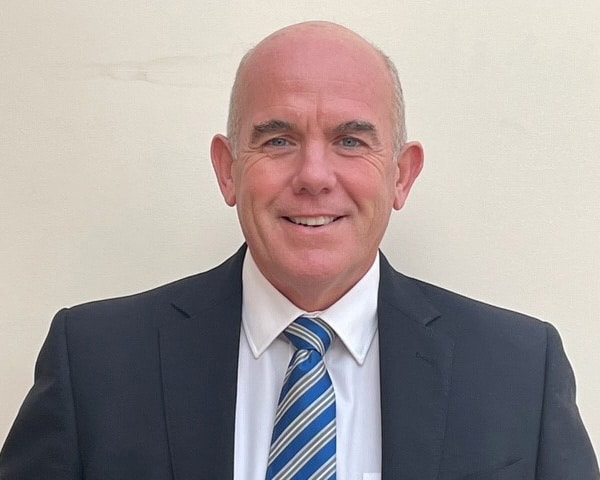
The TDSAP continues to thrive due to the dedication and commitment of its membership and the contributions made by those organisations that work in and across the two local authority areas. The Partnership and the members on its subgroups have continued to monitor the progress that has been made against the priorities that were agreed for 2023/24. This has been achieved through audit processes and we have also undertaken an internal review to identify how we as a Partnership can learn from our past experiences and improve our own structure and delivery.
I have been actively engaged at a regional level and I have attended the National Chairs meeting to ensure that the Partnership remains outward facing and is agile in addressing new and emerging issues within adult safeguarding. Outside of the Partnership meetings I have also met on a regular basis with the two Directors of Adult Social Services and the senior leaders of all the organisations that are represented on the Board which has provided the additional opportunity for me to challenge and seek assurance that services are being delivered to meet the needs of those in our communities. To reduce duplication and to improve the co-ordination across the Partnership I have also attended other strategic meetings which has provided me with confidence that our work is cross cutting and is being jointly delivered.
In the past twelve months the Partnership has made some significant changes to the way that it works. Many of these changes have been highlighted throughout this report and these demonstrate the hard work that has been completed by all of those involved in the Partnership. The Partnership however continues to seek improvements across all areas of our business and we will need to ensure that the learning and improvements that have been identified in the past twelve months have been truly embedded into frontline practice. We will continue to monitor these areas as we move forward.
I am particularly proud of the changes that have been made to quality assure and deliver our Safeguarding Adults Review processes. This has been achieved through the dedication of subgroup members and the commitment that has been shown by all the organisations that have been involved. This work has not been without its challenges, particularly in managing the outcomes and delivery of the recommendations and action plans which has continued to impact on the resources within each agency. To the credit of all concerned and from the evidence from a recent audit we know that systems are now in place or being developed to implement and monitor progress within each agency.
There has also been a clear desire from those in the Partnership to ensure that we increase the involvement of those within our communities who use services. We have looked at national best practice and in the past twelve months have actively moved towards a more sustainable and inclusive model of co-production.
I would like to take this opportunity to thank all the agencies for their contribution to the Partnership.
Section 2: Our Purpose
The Torbay and Devon Safeguarding Adults Partnership (TDSAP) is the collective name for the partners that work with the Board to safeguard adults across Torbay and Devon.
The TDSAP provides strategic leadership for adult safeguarding across Torbay and Devon and is independent, with an independent chair.
The core objective of the Safeguarding Adults Partnership, set out in section 43(2) of the Care Act 2014, is to help and protect adults in its area in cases where an adult has care and support needs and;
– They are experiencing, or at risk of experiencing, abuse or neglect; and
– As a result of those care and support needs, they are unable to protect themselves from either the risk of or the experience of abuse or neglect
The TDSAP acts as the key mechanism for agreeing how agencies work together to safeguard and promote the safety and wellbeing of adults at risk and/or in vulnerable situations. It does this by co-ordinating what each of the TDSAP members does and ensures that they do it effectively.
Section 3: Our Structure
The TDSAP has established a meeting structure to undertake work on behalf of the Partnership.
The TDSAP has two groups reporting into the Board namely the Safeguarding Adults Review Core Group and the Operational Delivery Group.
Reporting into the Operational Delivery Group are three sub-groups namely the Learning and Improvement sub-group, the Performance and Quality Assurance sub-group and the Community Reference Group (CRG). These meetings will continue to be supported by the Partnership Practice Lead, Partnership Business Manager and Partnership Co-Ordinators.
The CRG is currently under review to ensure a better focus on co-production, by working in Partnership with people, service users and third sector representatives to raise awareness, improve understanding and shape effectiveness of specific elements relating to the safeguarding of adults.
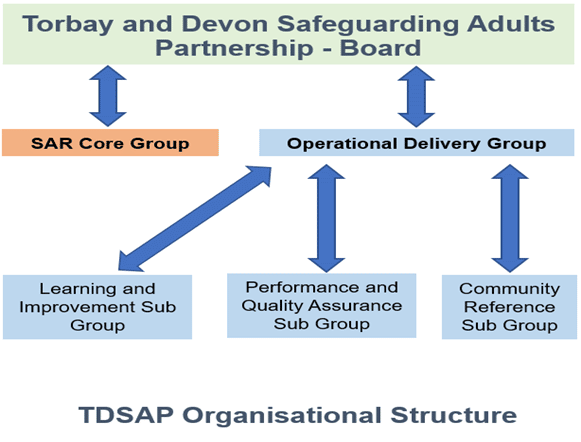
Section 4: Our Partnership Members
4.1 Statutory Partners
The Statutory Partners of the TDSAP are Devon County Council, Torbay Council, NHS Devon and Devon & Cornwall Police.




4.2 Partners
Other partner members of the TDSAP are:
- Torbay and South Devon NHS Foundation Trust (TSDFT)
- Devon Partnership Trust (DPT)
- Royal Devon University Healthcare NHS Foundation Trust (RDUH)
- NHS England (NHSE)
- University Hospitals Plymouth NHS Trust (UHP)
- Livewell Southwest
- Devon and Somerset Fire and Rescue Service (DSFRS)
- South Western Ambulance Service NHS Foundation Trust (SWASFT)
- Care Quality Commission (CQC)
- Healthwatch
- Department for Work and Pensions (DWP)
- Voluntary and Community Services Representatives (VCS)
- His Majesty’s Prison Service (HMS)
- Housing Representatives
- The Probation Service – Devon and Torbay
- The Heart of the South West Trading Standards
- District Council Representative
Section 5: Safeguarding Activity
The data below is routinely monitored through the Performance and Quality Assurance (PQA) Sub Group and by Board Members to identify trends and areas for additional scrutiny. This includes variances against national and comparative area data. The data has been included in this report to demonstrate the safeguarding activity over the 2023-2024 period.
5.1 Section 42 – Safeguarding Concerns
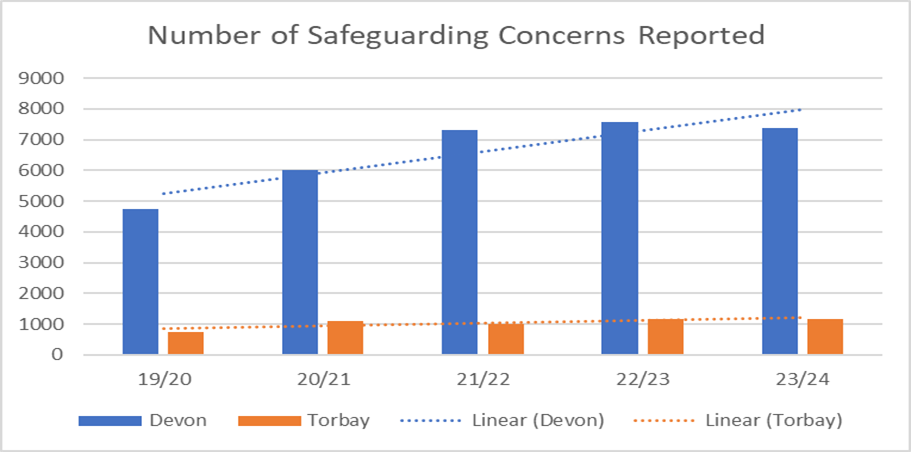
The general trend in the number of safeguarding adults’ concerns in Devon has been upwards but there was a fall between 2022-23 and 2023-24. This drop may be due to changes in the front door procedure to Adult Social Care and centralisation of the safeguarding teams.
In Torbay, the linear trend continues to be upwards but by only 2% between 2022-23 and 2023-24.
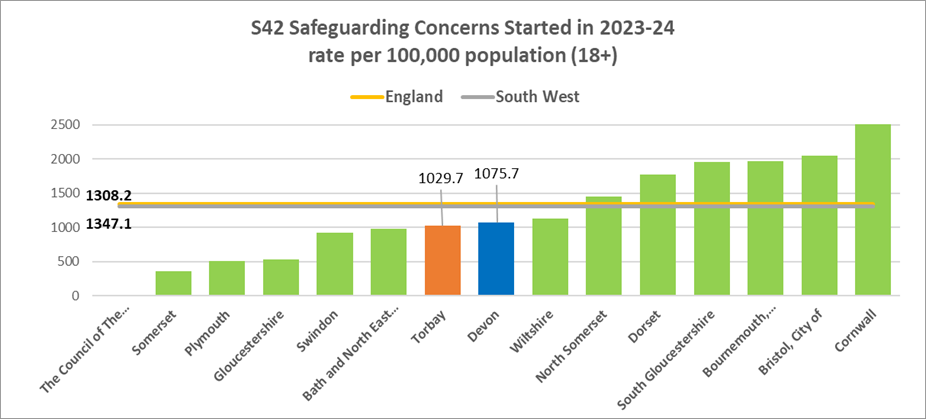
Expressing safeguarding concerns as a rate per 100,000 population (18 and over) allows for comparability. This shows that both Devon (1029.7) and Torbay (1075.7) have safeguarding concern activity levels below the national (1347.1) and regional (1308.2) averages and are at the lower end of the regional comparator authorities.
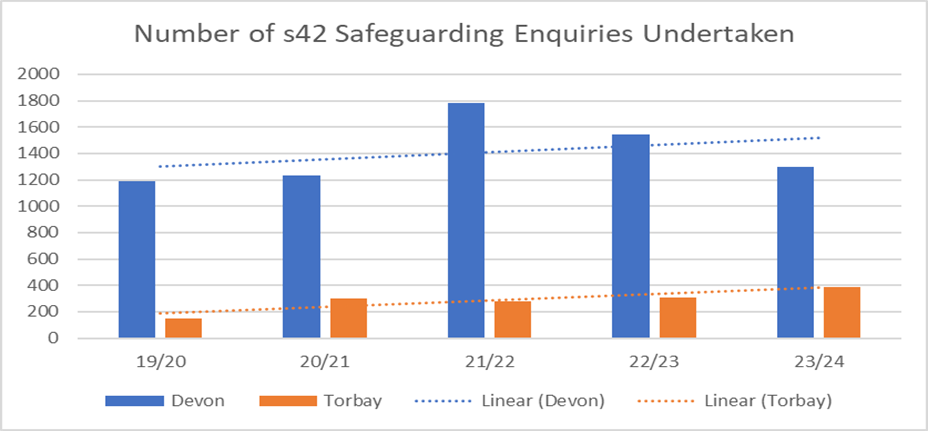
The number of s42 safeguarding enquiries (concerns that meet the threshold for further investigation) undertaken by Devon are now following a downward trend and have fallen by 16% on the last financial year. Safeguarding enquiry activity levels in Torbay continue to be on an upward trend and have risen by 26% from 2022-23.
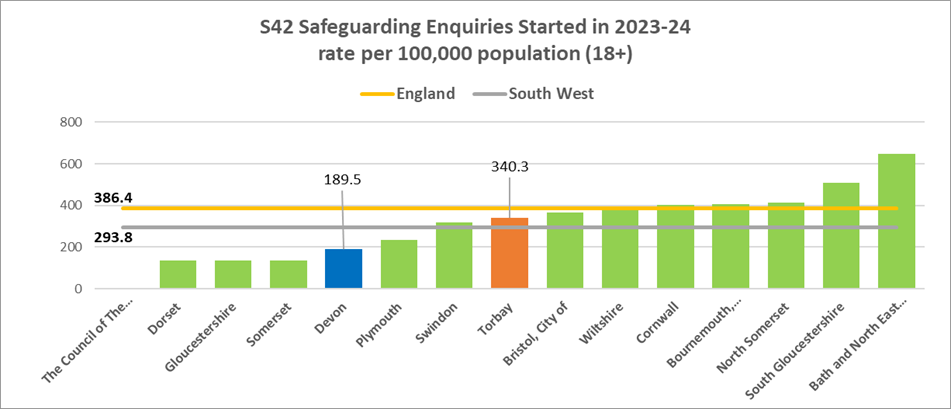
For s42 safeguarding enquiries started during 2023-24, the Devon rate has fallen again to 189.5 from 214.5 in 2022-23. The rate is now substantially below the rate for England (386.4). The rate for Torbay has increased from 271.8 in 2022-23 to 340.3 for 2023-24 and is now above the average for the South West (293.8) but remains below the rate for England.

The conversion rate for concern to enquiry for Devon has fallen again this year to 19%, well below the England rate of 31% and South West comparators of 27%. The rate for Torbay is 33%, above both comparators.
2. Demographics
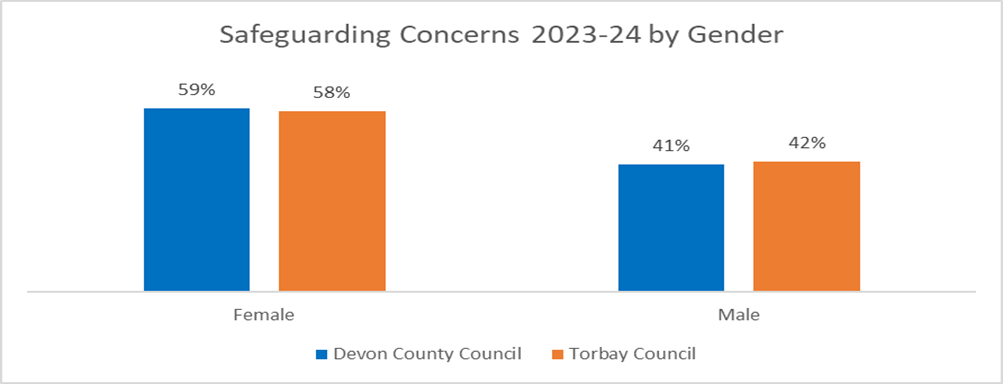
59% of individuals in Devon and 58% in Torbay involved in safeguarding concerns for 2023-24 were female. This is consistent with the national percentage of 57% and with the percentage of females supported by Adult Social Care in Devon and Torbay.
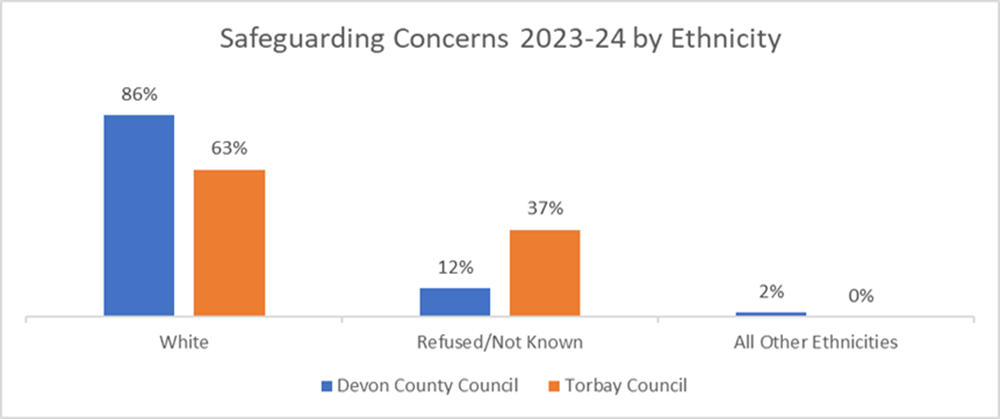
86% of individuals in Devon and 63% in Torbay involved in safeguarding concerns in 2023-24 recorded their ethnicity as white. 82% of the population recorded their Ethnicity as white in the 2021 census. For both authorities, a number of concerns do not have ethnicity recorded (12% in Devon, 37% in Torbay) and this is likely to result in an under representation of other ethnic groups.
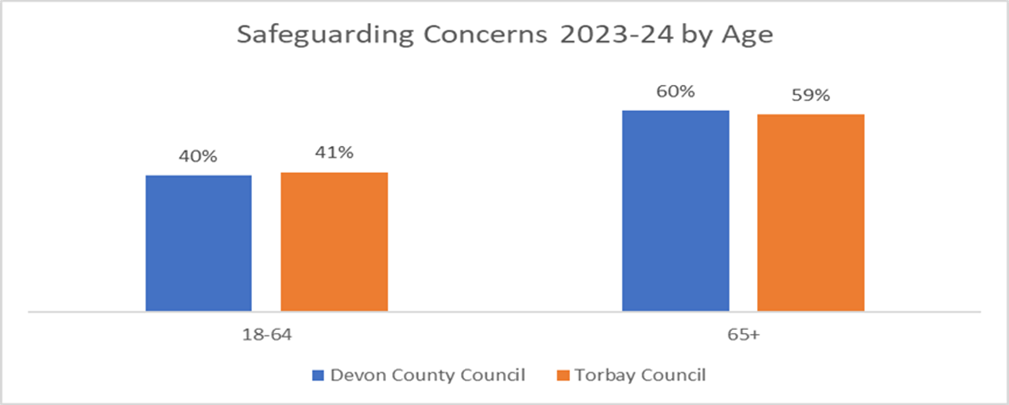
60% of concerns in Devon and 59% in Torbay relate to individuals aged 65 and over, although 69% of adults supported by Devon and 65% in Torbay are over 65.
3. Location of risk
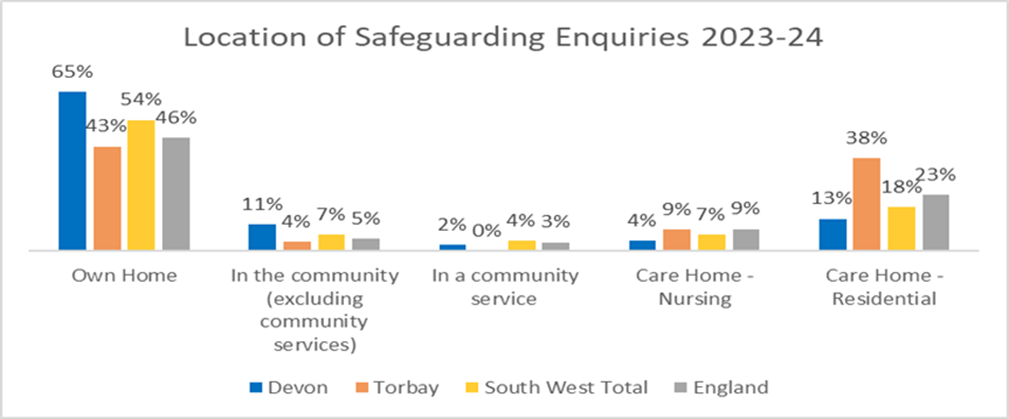
In Devon, 65% of s42 enquiries and 43% in Torbay took place within the individual’s own home. This is similar to last year for both authorities but still higher than the national picture of 46% for Devon.
The national comparator for enquiries recorded in care homes is 32% for 2023-24. Devon has a rate of 17% which has fallen from 20% in 2022-23. In Torbay the proportion is 46%, similar to last year but continuing to be ahead of the national comparator, probably reflective of the higher proportion of care home beds in the authority.
4. Types of Risk
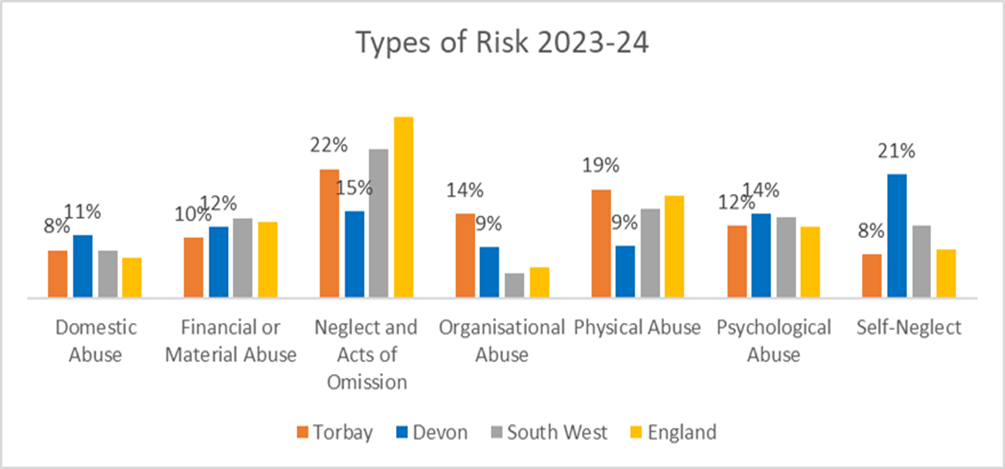
With regards to completed enquiries, in Devon, the most common sources of risk in 2023-24 were Self Neglect (21%), Neglect and Acts of Omission (15%) and Psychological Abuse (14%).
In Torbay they were Neglect and Acts of Omission (22%), Physical Abuse (19%) and Organisational Abuse (14%).
This is a similar picture for both authorities to 2022-23. For England, the most common sources of risk are Neglect and Acts of Omission (32%), Physical Abuse (18%) and Financial or Material Abuse (13%).
5. Making Safeguarding Personal (MSP)
Approaches to safeguarding should be person-led and outcome-focused.
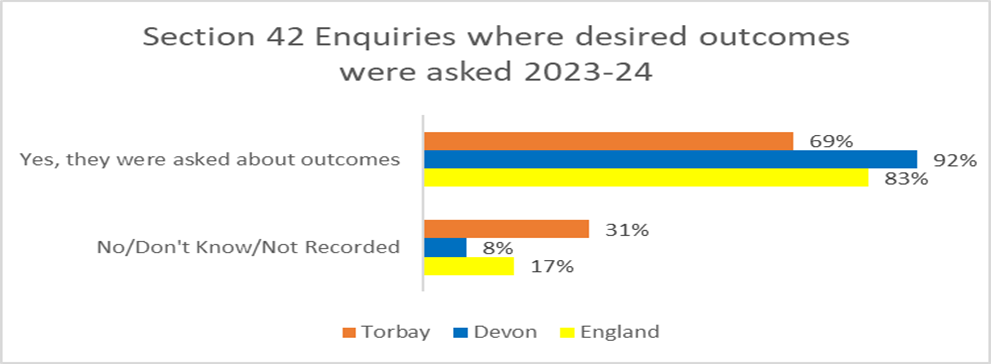
In Devon 92% of people or their representatives were asked about their desired outcomes in safeguarding enquiries in 2022-23.
In Torbay this was 69%. Not all desired outcome data was able to be captured in Torbay but changes have been made so that this information is now recorded for all s42(1) and (2) cases.
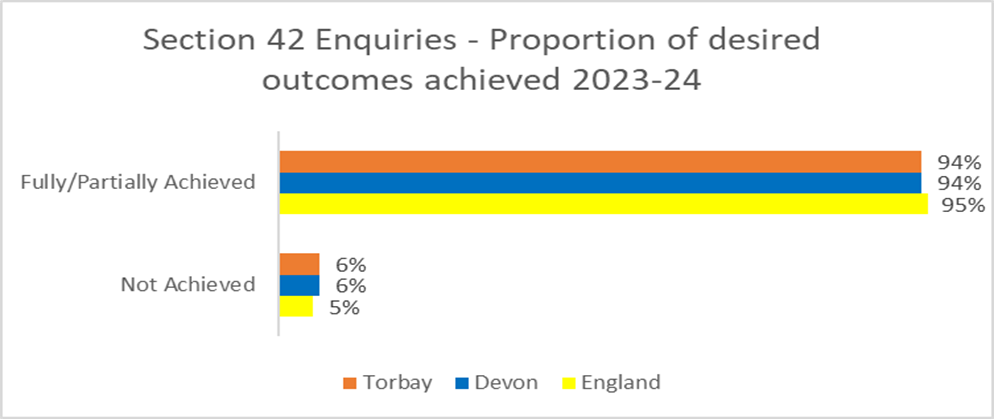
Of those asked about their desired outcomes, 94% in both Devon and Torbay had their outcomes either fully or partially met. The percentage for both England and the regional comparators is 95%.
Section 6: Safeguarding Adults Reviews (SARs) and our SAR Core Group
6.1 Summary
Safeguarding Adults Reviews (SARs) are a statutory duty under the 2014 Care Act for Safeguarding Adults Boards to undertake. A SAR is completed when:
- an adult dies as a result of abuse or neglect, whether known or suspected, and there is concern that partner agencies could have worked more effectively to protect the adult
- an adult is still alive but has experienced serious neglect or abuse and there is concern that partner agencies could have worked more effectively to protect the adult
- Boards may also arrange for a SAR in any other situation involving an adult in its area with needs for care and support.
SARs are a way for all agencies of the Partnership to identify the lessons that can be learned from particularly complex or high risk safeguarding adults cases and to implement changes to improve services.
The TDSAP has a dedicated SAR Core Group. The SAR Core Group is responsible for decision making on new SAR referrals and for managing all SARs through to completion. The SAR Core Group maintains effective oversight in relation to the progress of each SAR and reports quarterly to each TDSAP Board meeting.
The SAR Core Group membership consists of multi-agency partners who meet regularly. The SAR Core Group members include representatives from NHS Devon ICB, Torbay County Council, Devon County Council, Devon Partnership Trust (DPT), Devon and Cornwall Police and partner representatives from other organisations as required.
More specific supporting information on SARs can be found on the Torbay and Devon Safeguarding Adults Partnership (TDSAP) website here: TDSAP Safeguarding Adults Review Multi-Agency Policy
6.2 SAR activity during 2023/24
The TDSAP received eight SAR Referrals in 2023/24 from six different partner organisations.
Following thorough consideration of these SAR referrals, the SAR Core Group decided that two of them met the criteria for a SAR review to take place, as defined within Section 44 of the 2014 Care Act.
The themes from these referrals include:
- Mental health (any support that people receive to protect or promote their mental health and psychosocial wellbeing)
- Self-neglect (a person being unable, or unwilling, to care for their own essential needs)
- Substance misuse (Substance misuse develops when you continue to take substances which change the way you feel and think)
- Neglect/Acts of omission (the failure to meet individuals basic and essential needs, either deliberately or by failing to understand these).
In 2023/24 the Torbay and Devon Safeguarding Adults Partnership completed six SARs, all of which were published on the TDSAP website.
With all SAR reviews, the identified learning and SAR recommendations are progressed and embedded into operational practice. The purpose of a SAR is not to reinvestigate or to apportion blame. It is an opportunity to uncover learning for all partner agencies involved and to make changes to practices in the future.
More information is available on our website about SAR Thresholds, how to complete a SAR Referral here and our previously published SARs here
6.3 Published SARs (including date of publication)
6.3.1 SAR Erik (April 2023)
Erik was a 48-year-old man described by long standing family friends as having had very poor social skills with mild/moderate learning disabilities.
Erik’s mother was the one stable feature in his life. Over the last few years, she had become increasingly ill, resulting in 24 hour residential care. This stability that Erik had from his mother for much of his life faded away leaving Erik isolated and vulnerable.
He was highly motivated and worked for a landscape gardener. Erik greatly enjoyed this and is said to have excelled in this role. However, this came to an end which further diminished Erik’s network and exacerbated his isolation. Although he was subsequently employed with a cleaning company, this ended abruptly and is said to have been due to inappropriate behaviour.
Erik was found hanging from scaffolding in Exeter on the 1st April 2021.
The death followed a number of concerns that identified Erik as a victim of cuckooing and being taken advantage of by others. There were also concerns about Erik experiencing anxiety, low mood and social isolation. Erik was described as vulnerable due to alcohol dependency and learning difficulties. The review identified that Erik also had vulnerabilities from past trauma and losses.
Learning identified include:
Although Erik was known to a number of partner agencies, and there is evidence of pockets of good practice, not all partner agencies recognised Erik as a victim of cuckooing.
The TDSAP Escalation protocol was not used as a means to address professional disagreements regarding the risks and escalating concerns identified by some partner agencies.
Professional curiosity should have been applied to understand Erik’s inconsistency in his wish for support by partner agencies. Partner agencies to increase awareness and understanding that people such as Erik, who had known criminal offences himself, are targeted intentionally by those who exploit knowing that he would have been reticent to involve the Police and may have been seen as an unreliable witness.
Taking a trauma informed approach will support engagement and a focus on how communication can be tailored to people with complex needs, such as Erik, to ensure understanding when there is non-engagement form the person.
The lack of specific legal framework and ‘cuckooing’ as an offence has resulted in TDSAP sharing the full SAR Erik report with the Drugs Supply and County Lines Unit at the Home Office and with the National Crime Agency, so that it can form part of the evidence gathering for potential future legislative developments specifically around cuckooing.
The full SAR report is available here
6.3.2 SAR Hermione (June 2023)
The Torbay and Devon Safeguarding Adults Partnership commissioned this SAR in respect of Hermione who experienced serious harm in circumstances where agencies could have worked together more effectively to prevent this.
Hermione, a white female, has diagnoses of Autism Spectrum Disorder, Tourette’s Syndrome, Post Traumatic Stress Disorder and ADHD.
After expressing her intention to attempt suicide, Hermione was detained in children’s psychiatric units under section 3 of the Mental Health Act in Devon, then a paediatric intensive care unit in Berkshire prior to her 18th birthday, when she was discharged home to Devon.
After a period at home, Hermione was placed in a residential college for young people with autism in Somerset which broke down due to Hermione’s self-harming behaviour and suicide attempts. Hermione moved to a second specialist autism college with onsite mental health support in Dorset in early 2020, where her self-harm continued to escalate.
The college gave notice because Hermione was making plans to take her life and because a specialist placement could not be identified. A multi-disciplinary professionals meeting agreed a care plan to temporarily support Hermione in a hotel in Devon with a package of 3:1 support. However, Hermione absconded out a window and drank several bottles of Calpol, sending a note by email to her college that indicated her intention to take her life.
She took a train, intending to travel to Beachy Head, but had to disembark after becoming ill and was found by Police in Wiltshire. Hermione was taken to an acute hospital in Wiltshire where she was placed in an induced coma after an urgent decision was taken by clinicians to deprive her of her liberty and a best interest decision made to give life-sustaining treatment, before being made subject to a DoLS authorisation in the emergency department.
After being brought out of the coma, Hermione was assessed as not being detainable under either the MHA or DoLS. She was subsequently transferred to a psychiatric ward in a Dorset hospital, first as an informal patient and then detained under the MHA, before being moved to a high dependency rehabilitation unit where she was diagnosed with Emotionally Unstable Personality Traits and her mental health stabilised after a lengthy period of time.
Learning identified include:
All partners to consider reasonable adjustments to ensure services are provided in a way that works equally well for people with neurodiversity.
When people with autism and/or learning disabilities are challenging behaviours, partners need to ensure that detailed behavioural support plans travel with the person during any transfers.
Skilled health assessments to be included in all EHCP when planning for adulthood.
Partners should ensure transitions pathways and interagency escalation policies are well publicised and leadership support where robust and timely transition plans are not devised and implemented,
Where a person has frequent mental health admissions, clinical staff on key wards should attend multi-agency professional meetings to strengthen an integrated approach between hospital mental health teams and the wider professional network.
Partners should ensure that clear contingency planning is taking place for all residential placements and that proactive and timely arrangements are made for alternative provision when a provider has given notice due to escalating risks that they feel unable to manage.
Partners to ensure that a rigorous Mental Capacity Act (2005) training programme is in place for staff that include the concepts of executive and fluctuating mental capacity.
The profile of advocacy services to be raised to ensure provision of advocates to support individuals’ involvement in decision making process and enable timely challenge where appropriate.
Partners to ensure that restraint processes in all Heath and Social Care settings comply with the Restraint Network Training Standards and those applying restraint have been trained in BildACT accredited training.
The full SAR report is available here
6.3.3 Devon Multi Agency Systems Review (July 2023)
The Devon Multi Agency Systems Review identifies the learning following five homicides in Devon, between 2018-2019. This report has a focus on mental health care and management in custody. Primary focus of this review is on the learning from three homicides that occurred in 2019 by the same individual, referred to as Mr A.
Although Mr A met the criteria for a Safeguarding Adults Review (SAR), it was decided that a multi-agency systems review, led by NHS England and Improvement (NHSE), would be the most appropriate methodology to uncover the systems learning.
The full report is available on the NHS England publications page here
6.3.4 SAR Alec (October 2023)
Alec, a white male, was in the Royal Engineers and served his full time with them. He rose to the rank of Staff Sergeant and was awarded the British Empire Medal. Over the years, he did tours of duty in Germany, the Falkland Islands, several places in Great Britain and, notably, twice in Northern Island during the troubles when he was in charge of a small group who had the task of clearing booby traps from buildings. That experience had a profound effect on him.
It is highly likely that he suffered from undiagnosed PTSD, which he self-medicated, as the years went by, with increasing amounts of alcohol and drugs. His trade in the army was as a pipeline engineer which expertise could have led to very profitable work when he left the forces. However, this would also have led to further periods of working away from the family which he did not want.
Like many ex-servicemen and women, he found adjusting to civilian life difficult. He set up a business involving furniture restoration and buying and selling second hand goods. This lasted for some years but once that failed his marriage broke down and over time, he lost touch with his family. As early as the year two thousand he was showing early signs of mental health problems. He left Plymouth and began moving from place to place, without letting members of the family know where he was.
Alec was admitted to hospital following a 999 call and attendance at his home by the ambulance on 1st April 2022. Safeguarding concerns were raised by a nurse on the hospital ward and the ambulance crew on the basis of self-neglect. The crew documented that in their view he had been living in squalor and that the house was not fit for human habitation. He was described as emaciated.
During the 12 months prior to his death Alec had been treated as an outpatient at Tiverton District Hospital and seen on a number of occasions by staff at the Mid Devon Medical Practice. A doctor had visited him at home on the 30th March, two days prior to his admission to hospital.
Alec passed away in hospital on 5th April 2022 at the age of 70. The cause of death was pneumonia following a stroke.
Learning identified includes:
Two of the recommendations from the Thematic SAR Self-Neglect is also pertinent to Alec, the need for multi-agency meetings to be facilitated in cases of self-neglect with escalation where partners do not support this; and to ensure that the current training offer of all partner agencies include self-neglect, and legal literacy with respect to safeguarding, mental capacity Act (2005) practice, consent and information sharing.
Self-neglect guidance to be updated and promoted to improve staff understanding and confidence in assessing when this becomes a safeguarding matter.
The importance of risk assessments to be undertaken in circumstances of significant self-neglect and to promote the role played by the Fire Service Home Safety team in attending to individuals who hoard.
Mental Capacity Act (2005) training to increase practitioner awareness of the concept of ‘executive’ mental capacity and its significance when assessing individuals who self-neglect.
The full SAR report is available here
6.3.5 SAR Tony (November 2023)
Tony, a white British male, had a successful and varied career. From 1993 until his return to the UK in 2008, he spent his life in France. Tony has been described as a very patient man, one who was practical, supportive, independent and easy going.
Tony was diagnosed with several serious health issues over a number of years. These included bladder cancer, chronic obstructive pulmonary disease and rheumatoid arthritis which contributed to a sharp decline in Tony’s health in the last few years of his life. His mobility worsened, he experienced visual disturbances, a decline in his memory and he became noticeably frailer. Tony became more vulnerable to falls exacerbated by further diagnoses of osteoarthritis and postural hypotension.
In November 2020 Tony was admitted to an acute hospital emergency department with concerns of reduced mobility, reduced appetite and a urinary tract infection. Following treatment he was transferred to a Community Hospital setting for ongoing rehabilitation. Tony fell during this time sustaining a fractured hip resulting in a transfer back to acute care for surgery. Two weeks later Tony was transferred back to the Community Hospital setting for rehabilitation and a further three weeks later to a residential care home for ongoing rehabilitation. Less than two weeks later he was admitted back into acute hospital care with a suspected dislocation of his new prosthetic hip joint and emergency surgery was completed.
Tony died in February 2021 at the age of 89. At this time the UK was in it’s 3rd lockdown period of the Covid-19 pandemic.
Tony leaves a wife, Anne, who has very much been involved in allowing the review to build a picture of not only Tony as a person but how the health & social care system has responded to Tony as a patient/client and herself as a carer.
Learning identified includes:
Considerations whether service provision for those deemed to be severely frail is effective and commensurate with demand, specifically vulnerability to falling and the local and national impact on health and social care organisations and people such as Tony.
Improvements in transference of care between two GP practices as Tony was temporarily registered with a new surgery when he transferred into a residential care home short term. Clinical care was impacted by the ‘incoming’ practice only having limited access to electronic records.
Improvements in medication prescribing and ensuring medication is available as early as possible.
The review acknowledged the TDSAP Guidance on Safeguarding and Falls; and Safeguarding and Medicines Management that had been developed and published, and recommended recirculating and promoting this guidance.
It further identified the need for improvement of unpaid carers’ experience in terms of accessing support, the quality of advice, timeliness and ensuring the offer of a carers assessment.
The full SAR report is available here
6.3.6 SAR Stephen (November 2023)
Stephen was a 60-year-old man of white UK heritage who lived alone in a property left to him in Trust after his father died in June 2017. He is described as having a ‘mild to moderate’ learning disability. In court reports he is also referred to as a person with autism, although he had never been diagnosed.
Stephen is reported to have been proud of owning his own home and of his possessions. Stephen had experienced significant bereavements. He lost his mother, followed by his father going into a nursing home and dying in June 2017. The family dog died around two years before the time considered in this SAR. Stephen kept the possessions of those he loved in the bungalow, he could not bear to let them go. Stephen would not let support workers clean or interfere with his possessions, he did not want items in the house touched or repairs made to the house. Stephen’s toilet was broken, he had numerous electrical items plugged into a chain of leads which created fire risk. Stephen did not want to move away from the bungalow and its memories.
Stephen was supported by Lifeways Community Care for ten years prior to his death. He was well-known to everyone in the local area who worked at Lifeways, he was chatty and would frequently telephone office staff as well as the helpline. He had the same support workers for many years and viewed some of them as family.
Stephen is described as a friendly and gentle person who wanted desperately to be liked. Stephen was heterosexual and saw himself as wanting a girlfriend.
Stephen could be overfriendly with people. He wanted to please people, to be liked. He invited people he had not met before back to his bungalow, giving his address and personal details to strangers. He was extremely lonely and either because of his feelings of isolation, and/or his struggle to use and weigh the information given to him by his support workers about risks, he placed himself in risky situations.
Stephen appears to have had a long history of alcohol use which impacted on his daily life. Stephen had not had support to reduce his drinking or to deal with the experiences or emotions that might be leading to increased use. Stephen did not have a great deal of money to spare. If Stephen was very intoxicated with alcohol this was usually because others had supplied it.
Concerns were raised regarding Stephen’s increased self-neglect, daily use of alcohol and increased levels of confusion. There was a view that he was deteriorating physically and mentally. There were delays in addressing these concerns. Stephen was murdered on the 14th December 2020. His body was not found until the 17th December as he had cancelled his support on the 15th December prior to this and no-one attended to Stephen on the 16th December.
Learning identified includes:
Safeguarding services to ensure practice includes vital conversations with referrers as part of information gathering regarding concerns. Expectations of the ‘four stages’ of safeguarding should be communicated to referrers, as this can inform them as to whether an agreed escalation pathway should be accessed to maintain their duty of care towards the individual for whom they have raised a safeguarding concern.
Policy, procedure, and guidance, including website materials, can be difficult for referrers to navigate and need to be aligned to promote consistent awareness of possible forms of abuse for a variety of users.
Consistent use of risk indicator and assessment tools will ensure a focus on potential safeguarding concerns. These tools to be updated frequently to reflect new knowledge and trends.
Safeguarding practitioners should receive specific support and supervision regarding decision-making in practice.
It is essential to continue to build working Partnerships that respect and listen to the skills, knowledge and experiences of partners who work in provider settings.
It is important to recognise the type of Enquiry needed (under Sect 42 of the Care Act (2014) and to be confident in leading and coordinating a multi-agency approach. Multi-agency approaches bring resourcefulness in creating protective options in complex situations.
Person centred safeguarding is not just about supporting a person to express their views and wishes, but about creating a relationship in which the person is facilitated to explore all the objectives of an enquiry, not only about risk and protection options, but also redress, recovery and resolution.
Partner agencies have a duty of care toward their employees. A published offer explaining the supports available, together with attention to the needs of those involved in tragic events, will not only fulfil the organisation’s duty but also contribute to a learning and resilient workforce.
The full SAR report is available here
Section 7: TDSAP Priorities 2021-2024
Under the Care Act 2014, the TDSAP must develop and publish a strategic plan that clearly sets out how it plans to achieve all its statutory objectives.
In developing this strategic plan, the Partnership has worked closely with partner organisations and sought input from community groups, to develop a set of priorities that best reflect the needs of Torbay and Devon.
The work of Partnership is not exclusive to these priorities: flexibility is a key characteristic of the TDSAP and priority will also be afforded to urgent themes and risks that present themselves throughout the plan period.
The TDSAP Board agreed these four strategic priorities for the period from 2021 to 2024.
- To embed the learning from Safeguarding Adults Reviews (SARs) into organisational practice
- To improve outcomes for people with needs for care and support by finding the right solution for them
- To work with partners to better understand and reduce the risk of ‘Hidden Harm’
- Improving Involvement and Engagement with people in receipt of safeguarding services
The TDSAP sub groups are assigned responsibility for completion of specific activities that support the 4 strategic priorities.
The Operational Delivery Group (ODG) holds the overall responsibility for completion of the business activities delivered by the sub groups and reports on progress to each TDSAP Board meeting.
The purpose and key achievements of the sub groups, to support delivery of the strategic priorities, is detailed in section 8 below.
Section 8: TDSAP Sub Groups
8.1 Community Reference Group
The purpose of the Community Reference Group (CRG) is to support the TDSAP by enabling the voice of people with a lived experience of safeguarding and relevant public perspectives across Torbay and Devon to inform future practice.
To achieve this purpose, the group have engaged with voluntary and community sector groups to find out what is understood by the term ‘safeguarding’ and provide insight into how awareness and reporting of safeguarding concerns might be increased. The CRG has also been able to give a view on the development of safeguarding policies and strategies, including the development of the TDSAP business priorities and the TDSAP annual report.
In early 2024, the TDSAP commissioned a review of the CRG. This review identified the need to better engage in co-production by working in Partnership with people, service users and third sector representatives to raise awareness, improve understanding and shape effectiveness of specific elements relating to the safeguarding of adults.
The review recognised that an approach of co-production allows those best placed to help design, shape and deliver specific aspects relating to safeguarding adults.
Co-production is a collaborative approach. It means involving those who receive support, along with their family, friends and carers with planning and delivery.
8.2 Learning and Improvement Sub-Group
The Learning and Improvement sub group has had a busy year reviewing its Terms of Reference and continuing to focus on driving learning and practice improvements across partner agencies resulting from the recommendations from Safeguarding Adults Reviews, and other identified focus areas for learning and development.
Due to the large number of Safeguarding Adults Reviews published by TDSAP there are currently ten SAR action plans being worked on by members of the Learning and Improvement sub group on behalf of the partner agencies they represent.
Areas of development include:
- Learning from SAR recommendations – Improved communication and sharing of information when there are safeguarding concerns. This sub group steered the adoption of a Safeguarding Information Sharing Protocol by partner agencies. It has continued to successfully work with partners to increase sign up to this protocol as published on the TDSAP website.
- Learning from SAR recommendations – Highlighting the risks of financial abuse which could be posed by anyone and the need for robust recruitment processes. The TDSAP financial abuse page has been refreshed and updated with improved information and links to further support. A provider briefing was co-produced with the Devon Care Home Collaborative highlighting the risks of financial abuse and the identified learning; with links to essential recruitment tools. This briefing was circulated to the provider networks across Torbay and Devon.
- Learning from SAR recommendations – Responding to situations when people in crisis are presenting risks to themselves or others. The development of a crisis advice flowchart, led by one partner, supported by the group, to ensure appropriate steps are taken by a partner agency when they become concerned that an individual may be experiencing a mental health crisis.
- Learning from SAR recommendations – Accessing support with safety and contingency planning when working with older couples where there is domestic abuse present in the relationship. A practitioner briefing was developed and circulated to partners which highlights the prevalence of domestic abuse in relationships of older people. It brings together a range of resources and access points for specialist advice and support. Domestic abuse charities across Torbay and Devon are currently working with the group to refresh current guidance around domestic abuse and unhealthy relationships.
- Learning from SAR recommendations – Lessons learned regarding exploitation in the form of cuckooing and the need for partner agencies to work together better to protect individuals more effectively in such circumstances. Practice guidance were adopted under the Partnership to support practitioners in such circumstances. A practitioner briefing was developed to highlight the learning and to promote the TDSAP Escalation protocol where there are concerns about how partners work together in such complex circumstances to protect people.
Other areas of learning also remain a focus of this sub group where it is identified action is required to raise awareness and promote the protection of adults at risk. Following the development locally of a vodcast on Predatory Marriage, further work has taken place with the Forced Marriage Unit in London, registrar services across Torbay and Devon and with other partners, to ensure further preventative work remain a priority.
The Learning and Improvement sub group continues to monitor closely the Partnership training offer and uptake from partners, including the private, voluntary and independent sectors. Demand continues to be high for all course presentations. All courses are running well, with good attendance and positive feedback from attendees. All course presentations remain virtual at this time and is reviewed on a regular basis.
8.3 Performance and Quality Assurance Sub Group
The Performance and Quality Assurance (PQA) sub group supports the Torbay and Devon Safeguarding Adults Partnership to take a strategic overview of the performance and quality of safeguarding activity across Torbay and Devon.
The Quality Assurance Framework is underpinned by the Care Act 2014 safeguarding principles. This includes the expectation that learning from quality assurance will be shared with partners to bring about positive change to practice and to improve outcomes for adults with care and support needs and their carer’s. The group meets quarterly, has clear terms of reference and a robust quality assurance framework and guidance which has been recently reviewed to support a renewed focus for the next 12 months.
The PQA supports the safeguarding Partnership to look at what we do, how well it is done and what difference we can make to improve and enhance operational systems and processes. Over the last year a partner audit with a specific focus on hidden harm has been completed which demonstrated that partner agencies are committed to taking the learning from SARs to improve practice culture whereby staff are being supported to identify hidden harm signs at earlier opportunities. This work is far reaching and continues in line with the Partnership’s strategic priority regarding the reduction of hidden harm.
During 23/24 the group undertook the TDSAP Annual Safeguarding Assurance audit. All partners contributed to the audit and have provided assurance and evidence to the TDSAP Partnership Board of continued multiagency engagement by all partners and continuously working to improve involvement and engagement with people who are experiencing safeguarding processes.
The sub group regularly reviews safeguarding adult performance audit data which supports the identification of areas where further assurance focus work is required. An example of that would be the current focus (2024/25) of the group regarding self neglect practice improvements which link closely with the Partnership’s strategic priorities regarding embedding the learning from SARs and improving the outcomes for people with needs for care and support by finding the right solution for them.
The PQA has further plans for a self-assessment audit of partners’ safeguarding processes, a multiagency audit regarding embedding learning from SARs and plan to complete a comparison review of prior and current Torbay and Devon SAR’s in order to identify recurring themes and understanding what further work needs to be undertaken to ensure that this learning is in fact embedded within safeguarding practice across the safeguarding footprint.
8.4 Operational Delivery Group
The TDSAP Operational Delivery Group (ODG) meets quarterly and is responsible for delivering the activities to support the TDSAP strategic priorities.
The group also considers safeguarding adults multi-agency practice, process and systems across Torbay and Devon to ensure that there is effective communication and quality working practice in place. The ODG does this to ensure that members of the public and services users are protected from potential abuse and harm.
A key purpose of the ODG is to ensure that the Learning and Improvement sub-group, Performance and Quality Assurance sub-group and the Community Reference sub-group (currently under review) report directly to the ODG on progress of priority activities from their respective sub groups.
To further address the strategic priority in relation to Hidden Harm, the ODG convened a multi-agency task and finish group to consider the progress of Hidden Harm activities across the system, with a specific focus on work currently taking place, future plans and identified gaps from partners.
The T&F Group provided the ODG with three specific multi-agency areas to focus on.
- Raise the awareness of Hidden Harm across partner organisations to assist and develop operational staff.
- Develop coercion and control practice guidance for operational use across partner organisations
- Update existing multi-agency training offer to include specific focus on hidden harm, especially in the context of self-neglect.
The approach taken has provided a good level of assurance, with specific examples to report back to the full TDSAP Board. All partners will continue to develop and progress their own activity with future assurances to be provided to the ODG.
During the past 12 months the ODG has had excellent representation from across the Partnership and demonstrated a strong commitment to shared ownership of the Partnership agenda. Tasks are also followed through, outside of the ODG meetings, to ensure priorities are completed in a timely manner.
Section 9: Key partner Achievements

DCC have centralised the 3 locality based safeguarding hubs to enable a single point of contact for all Safeguarding Adult Concern referrals made to Devon County Council. The intention is to deliver an equitable and timely response to Safeguarding Adult Concerns referrals and timely decision making and communications in relation to Section 42 of the Care Act (2014). The service will consist of a single management and leadership structure operating across the County.
DCC have developed a range of practice support guidance and tools around working with people who self-neglect and associated SharePoint page to support better practice. This was in response to the learning identified through the TDSAP thematic SAR self-neglect.
DCC have introduced Integrated Adult Social Care practice standards which includes safeguarding practice. Alongside this, a new Practice Quality Review tool and report examining the quality of safeguarding adult enquiries has been produced. This enables DCC to demonstrate quality assurance of completed safeguarding adult enquiries.
Within the Public Health and Communities Directorate, the team have continued to develop and strengthen the partnership that supports the Real time Surveillance System for suspected suicides.
Information from the police is received weekly and protocols are currently being revised to identify suicide clusters in order to prevent future deaths.
Public Health supported the Themed Adult Safeguarding Review into Mental Health. The commissioned Drug and Alcohol Treatment Services (Together) were a key part of the SAR panel.
Public Health continue to work in partnership with members of the Board and wider community to reduce preventable deaths relating to suicide and substance use including, issuing drug alerts and developing an incident response plan linked to preventing drug related deaths in Devon. Public Health have championed the need to review deaths of the homeless population, often as a result of deaths of despair
The Public Health team are currently reviewing the Suicide Awareness section on the TDASP website and working with Colleagues across Torbay and Plymouth to host a conference exploring the links between suicide and Domestic Violence and Abuse.


Services include a delegated responsibility from Torbay Council for local authority safeguarding duties. We often see the benefit of our integrated services in our local safeguarding system, by providing timely health and social care responses to the safeguarding concerns we receive.
Torbay continue to receive qualitative feedback from people who experienced a safeguarding response through independent quality checkers. Feedback continues to be very positive. People tell us that they feel included and listened to, that the process is fully explained to them and that they value the safeguarding response. In the past 12 months we have introduced a qualitative feedback system for people’s representatives and people living in care settings.
Within our health regulated services, the Friends and Family Test (FFT) is an important feedback tool that supports the principle that people who use NHS health services should have the opportunity to provide feedback on their experience. It asks people if they would recommend the services they have used and offers a range of responses. When combined with follow-up questions, the FFT provides a method to highlight both positive and negative patient experience.
Our safeguarding team in our health regulated services continue to expand their expertise, providing guidance, support, advice, and safeguarding supervision to a wide range of services and teams across community health and acute settings. In the past 12 months, we have continued to focus on further embedding the Mental Capacity Act into practice and improving responses which establish safety plans based on robust risk management in cases of domestic abuse.
Within our adult social care services, we have developed new resources to support Mental Capacity best practice, including three new Mental Capacity Act short films for care home managers on making best interest decisions, preparing for and understanding Mental Capacity Act assessments. We have also responded to peer review recommendations by improving live safeguarding data to support our oversight and performance in response to safeguarding concerns.
All our services demonstrate a continuous commitment to promoting learning from safeguarding reviews and other learning reviews. Other than Mental Capacity Act recommendations we have, for example, seen increases in safeguarding duties being used to support people with care and support needs who self-neglect and those who experience domestic abuse.
As an organisation that covers Torbay and Devon local authority geographical boundaries we continue to recognise and support the value of the Torbay and Devon Safeguarding Adults Partnership (TDSAP) and its capacity to create a consistency of approach in local safeguarding arrangements. We very much welcome being part of the TDSAP and will continue to support its arrangements as needed.

Following several SARs that highlighted the need for early identification of risk we now have introduced a process within our Central Safeguarding Team whereby repeat low grade Public Protection Notices (PPN) are flagged for a review. Now, if an individual has 3 or more low grade PPNs submitted within a 3 month period, it is flagged for review so that officers can assess whether risk is escalating or whether, by looking at the incidents in a wider context, rather than as isolated incidents, the risk level should be raised and more proactive safeguarding measures taken with partners.
Fraud is the most commonly experienced crime in the UK, affecting UK society economically and socially and disproportionately impacting upon vulnerable adults. Devon and Cornwall Police has introduced a Fraud and Triage Support Team within that sits within the Serious and Organised Crime Branch. The purpose of the team is to improve our response to fraud and will focus on 4 areas:
1. Crime Data Integrity – the correct recording and initial response to fraud,
2. Pursue – improving investigations via the provision of specialist advice and support,
3. Safeguarding the vulnerable – improving the safeguarding response to victims vulnerable to fraud,
4. Protect – increase the provision of protect messaging to reduce the number of victims of fraud.
Devon & Cornwall Police is committed to working with our partners and other forces in the region, to stop the flow of drugs into our counties and to disrupt the associated criminal activity, during intensified operations like Operation Scorpion and all year round. The aim of Op Scorpion is a collaboration between police forces in Devon and Cornwall, Dorset, Avon and Somerset, Gloucestershire and Wiltshire, their respective Police and Crime Commissioners, British Transport Police and the South West Regional Organised Crime Unit (SW ROCU) to bring relief to communities blighted by the antisocial behaviour, crime and fear which accompanies the misuse of drugs, and to safeguard vulnerable people.
Right Care Right Person (RCRP) is a national approach, across police, health, and social services with the objective of ensuring people in need receive the right care from the right person.
In September 2023 the National Partnership Agreement supporting RCRP was signed by ministers from the Department of Health and Social Care and Home Office, and the Chief Executives of NHS(E) and the College of Policing, and the Chief Constable holding the mental health portfolio for the National Police Chiefs Council.
Devon and Cornwall Police (DCP) convened the first jointly chaired RCRP Strategic Partnership Board in September 2023. A comprehensive RCRP governance structure was established. Adult and children’s social care representatives from unitary and county local authorities across Devon, Cornwall and Isles of Scilly were invited. South Devon and Torbay representatives from adult social care and Children and Family Health Devon continue to be members of the RCRP governance meetings. Southwest Ambulance Service Foundation Trust (SWAST), both fire and rescue services, both Integrated Care Partnerships (ICPs) and all local healthcare trusts are also included in the strategic and supporting meetings.
The principle of RCRP is that when no crime is apparent or suspected, the needs of a person should be met by the most appropriate agency. When no crime is involved or suspected, and the person’s need stems from a health, mental health or non-crime related vulnerability, Police should only respond to that person when a threshold is met. This can be framed that police should deploy when there is a real and immediate need to exercise police protection powers.
There have been 5 Scrutiny Panels, one of which was dedicated to children and young people, where police decision making, and records were shared with partners across social care and health to enable a transparent assessment of the decision making. No flaws in the principles have been identified. The service seeing the greatest impact was SWAST. Learning from partners at the scrutiny panels is that the threshold is being applied appropriately for children and young people by police contact officers.
Police have reinvested any time previously dedicated to non-crime concerns for welfare and patients leaving healthcare into reducing call handling times and improving patrol response time to urgent incidents.”

The Devon Partnership Trust (DPT) continues to be a proactive member of the Board and its various subcommittees.
In 2023-2024, clinicians within the Trust raised a total of 339 safeguarding concerns on behalf of our patients and completed a combined total of 257 safeguarding adults enquiries (under s42(2), Care Act) which had been caused out to the Trust by Local Authorities (Devon and Torbay) to lead. For 30% of these enquiries, the primary domain of abuse or neglect identified was self-neglect. We continue to ensure all registered clinicians and practitioners complete level 3 safeguarding training in both safeguarding children and adults.
Key initiatives in the last year have included:
- collaboration with partners regarding the implementation of Right Care, Right Person
- development of our Sexual Safety Committee which has resulted in leaflets and posters for the information of our patients, training and films on sexual safety for the information of our staff and an audit programme. 77% of all sexual safety incidents reported in 2023-2024 involved staff experiencing harm from patients, whilst 23% involved patients experiencing harm from other patients. 4% of all reported incidents resulted in moderate (or more serious) harm.
- increasing our offer of safeguarding supervision to our staff – doubling the number of safeguarding sessions delivered to staff (4486 staff sessions of engagement in safeguarding supervision occurred during the year). Safeguarding Supervision is delivered solely by members of the Central Safeguarding Team who have all completed training in restorative safeguarding supervision.
- Our Executive Board continues to be updated and provided with assurance on safeguarding through a:
- weekly safeguarding report
- Integrated Safeguarding Committee and the work of its associated subcommittees
- the internal Trust Safeguarding and Legal Bulletins delivered to staff bi-monthly – these provide staff with access to learning from Safeguarding Adults Reviews and complex safeguarding enquiries
- Learning and reports from our Executive Complex Case Forum
- Learning and reports from our Ethics Committee

The work of the team has been recognised locally in 2023 with a West Country Women’s Award for the Head of Safeguarding’s work to combat violence against women and girls in recognition of the work NHS Devon has done to improve how GPs and hospitals respond to people who have experienced domestic abuse or sexual violence.
In February 2024, an NHS England Safeguarding Visit took place. The meeting highlighted the significant system leadership changes during the year including the new ICB Chief Executive, Interim Chief Nurse and Interim Deputy Chief Nurse arrangements. Some of these changes have been mitigated by a stable NHS Devon safeguarding team who have been able to provide consistency to the safeguarding Partnerships and continue to keep safeguarding a priority though there are continued extreme pressures on health systems. Following NHS Devon taking on delegated responsibility for dental, ophthalmic and pharmaceutical services (POD) in April 2023, the safeguarding team have worked closely with the Collaborative Commissioning Hub to support the design and delivery of POD services.
Since the Liberty Protection Safeguards replacement to Deprivation of Liberty Safeguards were stood down by the current Government in 2023, the Mental Capacity Act (MCA) Lead has continued to work closely with the Continuing Healthcare Team (CHC) to ensure that individuals deprived of their liberty within their own homes, known as community deprivation of liberty, are safeguarded. To support this and other aspects of the Mental Capacity Act, the NHS Devon MCA lead organises and chairs a Devon wide network that supports MCA leads in Trusts to share practice and resources.

We continue to put people at the centre of our safeguarding practice and encourage all our staff to see Safeguarding as ‘core business’. We provide education and training on all areas of safeguarding and a particular focus on self-neglect, seen through a lens of trauma informed practice. Our staff continue to recognise safeguarding issues and the numbers of ‘concerns raised’ with Devon County Council’s Safeguarding team continue to increase month on month.
The Mental Capacity Act (MCA) team are fully integrated across the Trust and we have developed our education, patient records and internal processes to identify and support patients and staff when an individual may lack capacity and is deprived of their liberty. We are prepared for the introduction of Liberty Protection Safeguards (LPS).
In addition, we are a pilot site for a ‘Trauma Informed Shame Sensitive Project’ which identifies good practice and ideas for use in clinical areas in order to develop our approach and response to people when accessing our care. It also supports staff with their own experiences of trauma.

We have linked adult safeguarding training to pay progression for staff so we can ensure that this important learning is prioritised.
We have held quarterly safeguarding briefings for all staff to ensure learning from Safeguarding Adults boards is disseminated.
Staff have an increased awareness of exploitation/mate crime and are aware of referral pathways and actions required to protect vulnerable adults.

There is an agreement in place for all staff to undertake online scams training as part of their continued professional development (CPD), this is also the case for all new starters.
We were an active partner and panel member in relation to the SAR for Ella. We were able to help shape the learning resulting from this SAR review, which included an improved re-write to the financial abuse section of the TDSAP website.
We have strong links in place with partners and we are in regular contact with agencies, to assist in the safeguarding process, where individuals have been potential victims of scams.

SWAST have established safeguarding into the Trust governance structures. This means that Safeguarding activity is reported and discussed at our Safeguarding committee and the Quality Committee and Trust Board receive regular updates. The Safeguarding Service have also presented a safeguarding patient story to the Trust Board.
SWAST safeguarding service were supported to increase our safeguarding team. We now have a safeguarding specialist in each of our counties, 7 in total. This means that SWAST can attend more multi-agency meetings, join in more multi-agency work and better support our own staff in each area. We also have a Safeguarding Education Specialist and Learning Disabilities and Vulnerabilities Specialist in our team.
Within SWAST we have been able to increase the amount of safeguarding training our staff get. All staff complete online safeguarding training but from April 2024 all frontline staff have also had an extra 4.5hrs face-to-face training. This training was developed by a safeguarding education specialist and was bespoke to SWAST. This will help us to meet national guidance on safeguarding training for our staff.

We have developed and cascaded out to the Devon and Somerset Fire and Rescue Service a Tier 1 Safeguarding Training package for all staff across the organisation to complete to increase knowledge around safeguarding and ensuring clear and robust safeguarding processes are embedded throughout the organisation.
This is the first time all staff have been required to complete safeguarding training and we are now building on this and developing a comprehensive training strategy in addition to a competency framework.
We continue to work with numerous partners across Devon and Somerset and we continue to carry out Home Safety Visit for adults at risk. We deliver a comprehensive “Trigger Point Awareness Package” to partners to ensure they are aware of the signs to look out for that might mean someone is at risk of having a fire. This ensures we receive referrals at the earliest opportunity and can signpost individuals to support or raise safeguarding referrals where necessary if someone is at risk of having a fire.
Safeguarding Team and Home Safety Technicians have regular supervision and reflective practice which provides the opportunity to reflect on cases or visits and provides a safe environment for critical reflection, challenge and professional support which ensures safe practice, wellbeing being maintained and consequently improved outcomes for those at risk adults that we engage with.

The Livewell Southwest Adult Safeguarding team is hosting an Independent Domestic Violence Advocate (IDVA) in Partnership with the Plymouth Domestic Abuse service. Victims or survivors of domestic abuse can be frequent users of hospitals and other community health provision. The IDVA role focuses on increasing the numbers of Patients/Persons and Staff being identified as victims or survivors of domestic abuse, who can be offered timely support to prevent readmission and reduce the need for onward health services such as hospital or community services.
Livewell Southwest is working in Partnership with Plymouth City Council to develop an integrated Adult Safeguarding pathway. The project development focusing upon Plymouth City Council and Livewell Southwest merging individual Adult Safeguarding functions to produce a single pathway for referral, triage, and enquiry completion. This will involve staff from both organisations joining together to form a single Adult Safeguarding pathway and to remove handover points from the current process, therefore improving outcomes where a person has needs for care and support and is experiencing or may be at risk of abuse or neglect.
Livewell Southwest is currently facilitating Level 3 Adult Safeguarding training on a face-to-face basis as part of its mandatory workforce training commitment. The training has been developed in Partnership with the Adult Safeguarding operational team, where social workers have been delivering sessions to provide experiential knowledge as part of workforce development surrounding Adult Safeguarding
Section 10: Looking Ahead
10.1 Strategic Priorities
The TDSAP Board will review the Strategic Priorities from 2021-2024 and consider the most appropriate strategic focus from 2025 onwards.
Once agreed, these new priorities will be cascaded across the system by the Partnership via a new 2025-2027 Strategic Business Plan.